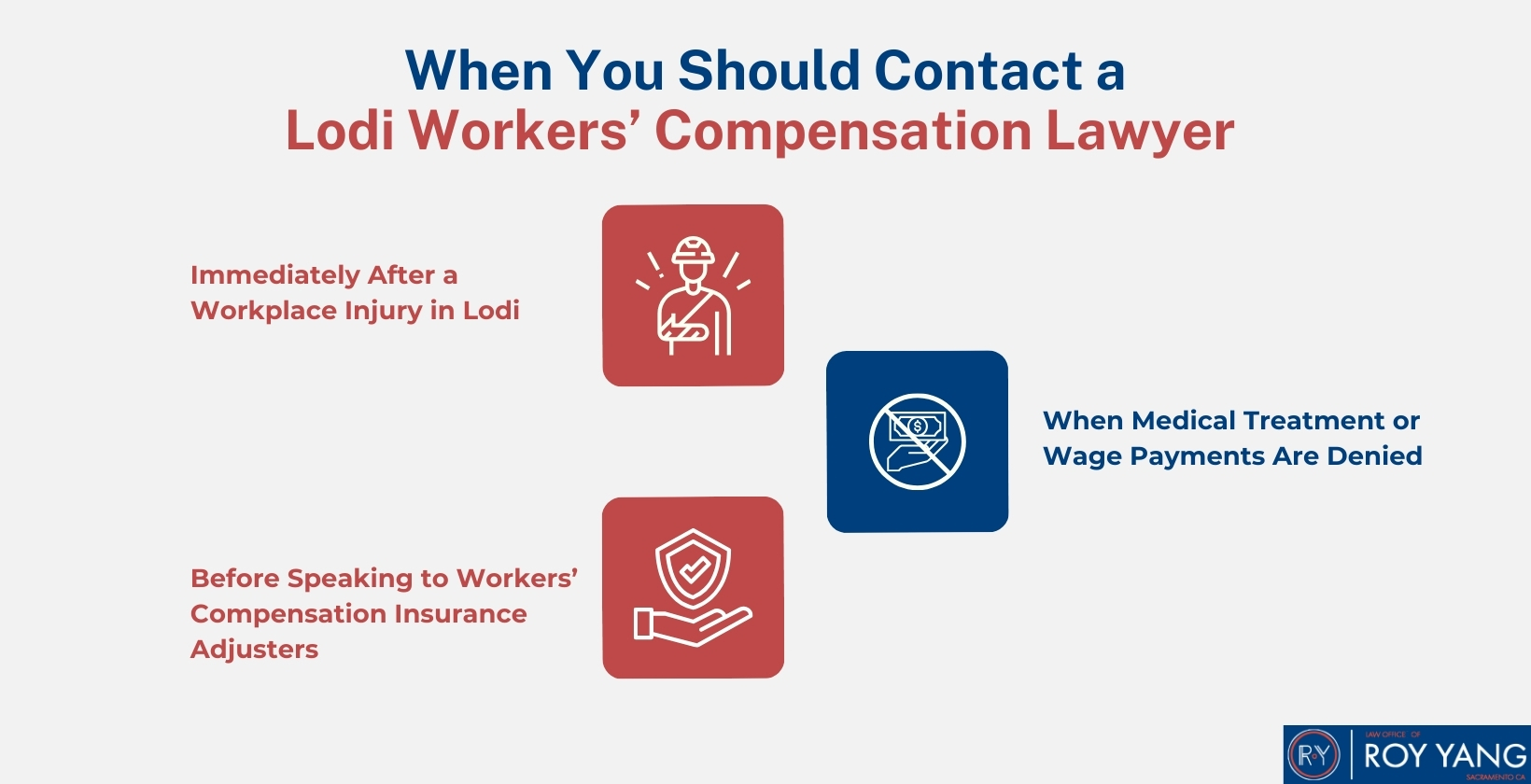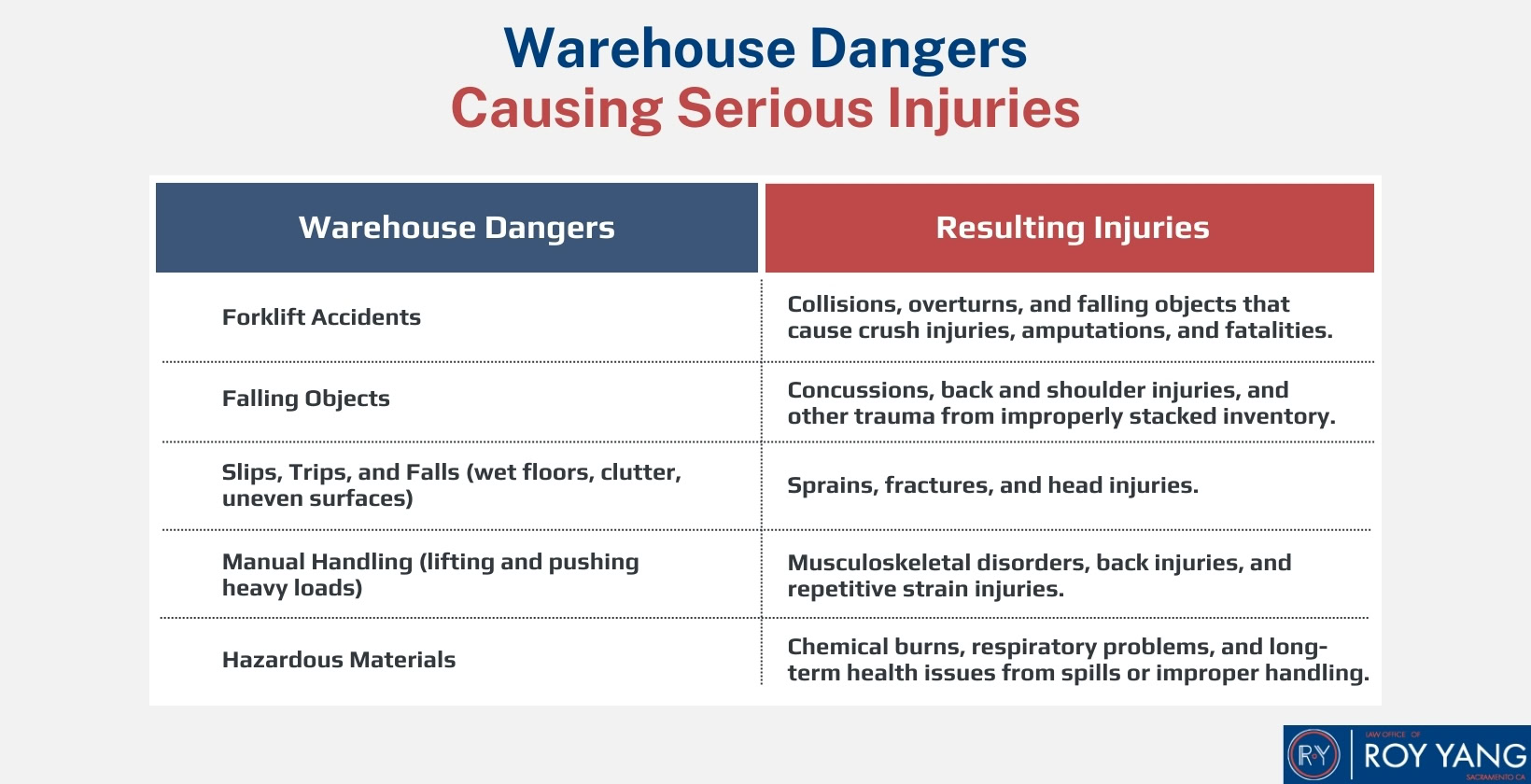


A sudden workplace injury can drastically impact your life, but with strong personal injury law guidance, you can recover both physically and financially, ensuring you get the compensation you deserve.
At the Law Office of Roy Yang, we help injured workers in Lodi and surrounding communities move forward with clarity and confidence, from filing their first claim to resolving complex disputes.
As trusted Lodi workers compensation lawyers, we bring over 15 years of focused experience helping local employees get medical care quickly and recover the full benefits they deserve under California law.
Whether you were hurt in a vineyard, warehouse, or on a construction site, you deserve fair compensation.
You don’t have to face this alone.
Let us help you protect your health, your income, and your future.
Remarkable Settlements

$225,000
Construction Accident

$175,000
Warehouse Accident

$150,000
Farming Accident

$75,000
Industrial Accident

What a Lodi Workers’ Compensation Lawyer Does for Your Case?
When you’re injured at work, the claims process can feel like a maze of forms, deadlines, and medical requirements. A Lodi workers’ compensation lawyer’s job is to hear your experience and guide you on your legal path.
The moment you reach out, our legal team steps in to manage the entire process, performing the following critical tasks on your behalf:
Files Accurate Workers’ Comp Claims Without Costly Mistakes
Any minor mistake in filling out the claim forms or a delay in submission can lead to a denial. We ensure all your paperwork is complete, accurate, and submitted on time, preventing common errors that can derail your claim from the start. We work to:
- Accurately complete Division of Workers’ Compensation (DWC) forms, including the DWC-1 Claim Form, to avoid missing details that insurers use to deny claims.
- Meet all critical deadlines, such as the 30-day window to report your injury and the 1-year statute of limitations for filing a claim, to protect your eligibility.
- Avoid common filing errors, such as incorrect dates or incomplete injury descriptions, which can lead to significant delays or rejection.
Builds Strong Medical Evidence That Stands Up in Hearings
Your case is only as strong as the medical evidence behind it. A Lodi workers’ comp attorney works with your medical doctors to make sure all the documents support your claim clearly and completely. This includes:
- Compiling all medical records, including reports from every doctor, specialist, and treating physical therapist.
- Coordinating medical-legal exams with a Qualified Medical Evaluator (QME) or Agreed Medical Evaluator (AME) to get an unbiased assessment of your condition.
- Gathering expert opinions to support the severity of your injury and its impact on your ability to work.
Represents Injured Workers in Negotiations and WCAB Hearings
Your workers’ compensation lawyer negotiates fair settlements with insurance companies on your behalf. We assess the claim’s worth and present the valuation. However, if negotiations fail or disputes arise, we represent you in hearings before the Workers’ Compensation Appeals Board (WCAB) or a workers’ compensation law judge.
How a Lodi Workers Compensation Lawyer Protects Injured Workers’ Rights?
A workers’ comp claim is more than submitting a form. It’s often complex, requiring you to fight with your employer or deal with the insurance company just to get what you’re legally owed.
Here’s how an employment lawyer protects your rights from day one, so no one takes advantage of your situation while you’re trying to heal.

Prevents Insurance Companies from Reducing Benefits
Insurers often try to limit payouts by questioning your injury, delaying payments, or offering low settlements. A workers’ compensation lawyer steps in early to block these tactics and hold the insurance carrier accountable. We prevent benefit reductions by:
- Responding to claims adjusters with clear, updated medical evidence
- Challenging attempts to reclassify or minimize your disability rating
- Pressuring the insurer to meet all payment deadlines under California law
Ensures Timely and Complete Medical Treatment
Delays in treatment don’t just affect your recovery; they weaken your claim. A workers’ comp lawyer works to get medical authorizations approved quickly and fights denials that leave you waiting for care. Here’s how we help:
- Requesting urgent review of treatment delays through
- Utilization Review (UR) and Independent
- Medical Review (IMR)
- Coordinating with treating physicians to document the medical necessity of your care
- Challenging attempts to downgrade or prematurely end treatment
Defends Injured Workers Against Employer Retaliation
It is illegal for your employer to punish you for filing a workers’ comp claim, but it still happens. If you’re facing retaliation such as demotion, termination, or threats after reporting an injury, your attorney will act fast to defend you by:
- Enforcing California Labor Code §132a to file formal complaints or legal claims
- Gathering supporting documentation, timelines, and witness statements
Protects Job Rights When Pressured To Return To Work Too Soon
Your doctor should determine when you are healthy to work again, not your employer. An employer may pressure you to return to work too early, risking further injury and jeopardizing your claim. We protect your right to a safe recovery by:
- Enforcing medical work restrictions from treating doctors or QME reports
- Reviewing any return-to-work offer to confirm it’s legal and safe
- Filing legal objections if your employer violates labor protections
Secures All Benefits Owed Under California Law
Most injured workers don’t know the full list of benefits they’re entitled to, and insurance companies rarely offer them voluntarily. We identify and secure every worker’s compensation benefit you are owed, including:
Wage replacement and medical treatment
Temporary Disability (TD) benefits to cover lost wages
Permanent Disability (PD) benefits for any lasting effects of your injury
Supplemental Job Displacement Vouchers (SJDB) for job retraining
Death Benefits
Strategies a Lodi Workers’ Compensation Lawyer Uses to Maximize Benefits
Securing benefits is only part of the process. Making sure those benefits are complete and fairly calculated is just as important. Many receive far less than they are owed because they don’t know the correct valuation of their injury.
Here’s how we ensure your compensation reflects the full impact of your injury.
Accurately Calculating Wage Replacement and Disability Payouts
Your weekly benefits and long-term disability payment amounts are based on specific calculations. An insurance company might use the wrong mathematics to reduce your payout, but we ensure your benefits are precisely calculated by:
- Confirming accurate average weekly wage using pay stubs, overtime, and bonuses.
- Reviewing QME/AME disability ratings and objecting to errors.
- Ensuring your permanent disability rating (PDR) aligns with your injury and work limitations.
Challenging Low Settlement Offers with Strong Evidence
Insurance companies often make a low initial offer, hoping you settle for the minimum.
We challenge these unfair offers by using a comprehensive legal approach and strong medical reports that document the extent of your injuries and their long-term effects.
We use accident documentation and witness statements to solidify the work-related cause of your injury, leaving no room for the insurer to dispute the facts.
Identifying Overlooked Benefits Like Vocational Rehab
Benefits like vocational rehab are often left out of early settlement offers because victims are not aware of them. An employment lawyer identifies and pursues any additional entitlements that boost your recovery and support your return to work.
These benefits may include Supplemental Job Displacement Benefits (SJDB), mileage reimbursement, or any open medical awards for continued treatment of your work injury after settlement.
Why Lodi Workers Trust the Law Office of Roy Yang for Workers’ Compensation Cases?
When choosing a lawyer, you’re not just hiring legal expertise; you’re choosing a partner for one of the most difficult times in your life. Here’s what makes Lodi workers trust and choose the Law Office of Roy Yang.
15+ Years Advocating Exclusively For Injured Workers
Roy Yang and team have spent more than 15 years focused solely on California workers’ compensation law. This exclusive dedication means we understand every stage of the claims process, from filing forms correctly to handling complex WCAB appeals.
Local Presence Serving Lodi And Surrounding Communities
The Law Office of Roy Yang serves clients across Lodi and the surrounding areas, including nearby agricultural towns and warehouse hubs. This local presence gives us insight into regional work hazards, the types of injuries common in the area, and the tendencies of local WCAB judges.
When you work with us, you get a team who knows the local system, the people in it, and the best ways to move a case forward in your community.
Bilingual Legal Support In English And Spanish
At the Law Office of Roy Yang, we believe language should never be a barrier to getting legal help. We provide workers’ compensation support in both English and Spanish, ensuring clients understand every step of their claim.
No Win, No Fee Workers’ Compensation Lawyer in Lodi
We work on a contingency fee basis, meaning you pay nothing unless we win your case. There are no upfront costs, no hourly rates, and no surprise bills. This risk-free and no financial obligation arrangement allows injured workers to get legal help without hesitation and focus on recovery instead of fees.
When You Should Contact a Lodi Workers’ Compensation Lawyer?
To ensure the best possible outcome, it’s best to contact a workers’ comp lawyer in any of these situations:
Immediately After a Workplace Injury in Lodi
Seek legal help immediately after a workplace injury to protect your rights and case value. Since the system enforces strict deadlines and rules, a single delay or mistake can put your benefits at risk.
Early legal support preserves important evidence, ensures proper injury reporting under California’s 30-day deadline, and reduces the risk of mistakes in your first claim form.

When Medical Treatment or Wage Payments Are Denied
If your medical care or wage payments stop unexpectedly or are denied entirely, it’s a sign you need legal backup. Insurers often delay or deny benefits without clear explanation, leaving injured workers unsure of their rights.
A workers’ comp lawyer will challenge the denial and terminations and push for immediate action.
Before Speaking to Workers’ Compensation Insurance Adjusters
Speaking with insurers directly without legal guidance can lead to accidental admissions that could be used to deny or reduce your benefits. Insurance adjusters may ask for a recorded statement or ask questions to find weaknesses in your claim. A lawyer handles all communication with the adjuster on your behalf so that your case is protected from insurance tactics.

What to Expect From Your Free Workers' Comp Case Review in Lodi?
A case review is designed to be a straightforward conversation about your experience, current situation, and your next options, all with no obligation. Here’s what to expect from your initial consultation:
Learn Your Workers’ Comp Rights Before Signing Any Documents
Before you make any decisions or sign a single piece of paperwork from your employer or an insurance company, you need to understand your rights. During your free case review, you get a clear and concise briefing on what you are entitled to under California law. Understand key protections, common pitfalls, and the power of your position.
Receive A Step-by-Step Strategy For Your Recovery and Claim
During your consultation, a workers’ comp advocate will listen to your injury details and your concerns, then outline a clear, step-by-step strategy for your specific case. We present a strategic plan that details how we will handle your claim, from gathering medical evidence to dealing with the insurance company, so you know exactly what to expect from the process.
Begin Your Workers’ Compensation Claim With No Upfront Legal Fees
Finally, you move forward with the best legal option with no upfront lawyer fees. Initial case evaluation is completely confidential and comes with no financial obligation, allowing you to begin the claim process with clarity and confidence. Your lawyer then builds the case strategy and begins the claim-filing process.
How Legal Help Speeds Up Your Workers’ Comp Claim?
Having legal expertise on your case significantly speeds up the claim process. An employment attorney’s primary role is to keep the process on track and resolve delays as they arise.
Getting Faster Claim Approvals Through Accurate Filing
An employment attorney handles paperwork accurately and meets deadlines promptly, which means a faster review and decision process. The legal approach generally includes:
- Thorough injury and medical documentation with no missing details.
- Accurate completion and submission of all DWC forms and supporting papers.
- Enforcement of deadlines on the insurers to challenge their delay tactics.
Resolve Disputes and Delays Quickly With Legal Advocacy
Disputes over medical documents, claim eligibility, or disability ratings often bring workers’ comp cases to a standstill. Legal advocacy intervenes to get things moving again by:
- Resolving medical disputes through the Independent Medical Review (IMR)
- Handling injury conflicts by preparing you for a Qualified Medical Evaluator (QME) exam
- Challenging insurer delay by filing legal petitions with the WCAB to compel a response from them
Maintain Proactive Communication With Insurers and Doctors
Delays in workers’ compensation cases often stem from poor communication. A lawyer serves as the central point of contact for all parties involved, facilitating a consistent exchange of information without overwhelming you. Your employment lawyer will proactively mediate between you, the law, your employer, insurance adjusters, and any other involved parties.
High-Risk Jobs in Lodi and Common Workplace Injuries
Many Lodi residents are employed in demanding sectors, which often come with a higher risk of injury. High-risk jobs such as agricultural labor and warehouse work present numerous hazards that can lead to serious injuries or even fatalities.
Agricultural Hazards Causing Serious Injuries
| Agricultural Hazards | Resulting Injuries |
|---|---|
| Machinery and Equipment (tractors, augers, power tools) | Crush injuries, amputations, lacerations, and entanglements. Tractor rollovers can cause fatalities. |
| Chemical Exposure (pesticides, fertilizers) | Chemical burns, skin conditions, respiratory problems, and long-term illnesses. |
| Heat Stress (long hours in direct sun) | Heatstroke, dehydration, heat exhaustion, and other heat-related illnesses. |
| Repetitive Motion (planting, harvesting, packing) | Musculoskeletal injuries, carpal tunnel syndrome, tendonitis, and back pain. |
Warehouse Dangers Causing Serious Injuries

Why Many Local Workers Face Delays in Receiving Benefits?
After a work injury, the last thing you need is a setback in getting medical treatment or financial benefits. Yet many injured Lodi workers without legal support face frustrating delays because of:
- Administrative errors and missing information on claim forms, slowing insurance approval
- Medical disputes over injury severity or links to pre-existing conditions
- Poor communication between the worker, employer, and insurance adjuster
Common Mistakes That Can Jeopardize a Workers’ Comp Claim
It’s easy to make mistakes when you’re confused and in pain, which is why legal advocacy is so vital. Common pitfalls that can jeopardize a worker’s compensation include:
Talking To Adjusters Without Consulting A Workers’ Comp Lawyer
Many injured workers mistakenly trust insurance adjusters and provide written or recorded statements they request. Those statements can be used to question claim credibility, minimize your injury, or justify delaying or denying your benefits.
Avoid talking to insurers before you consult with a workers’ comp lawyer. Follow legal advice to prevent undervaluation of your injury or denial of your claim.
Failing To Keep Consistent And Accurate Documentation
Without a correct and consistent record of your injury, medical treatment, and doctor reports, the insurance company has an easier time disputing your claim.
To avoid the pitfalls, maintain all your documents and create a timeline of events to provide a clear, indisputable narrative of your injury and its impact. Seek legal help to make sure no detail is overlooked.
Missing Legal Deadlines
Strict deadlines govern California workers’ compensation law. Missing a single one can bar your claim permanently, regardless of how valid your injury is. The most critical deadlines include:
- Reporting your injury to your employer within 30 days.
- Filing your claim within the one-year statute of limitations.
Returning To Work Too Soon
Your employer or financial stress can pressure you to return to work before you’re ready. However, going back before your doctor has medically cleared you can put your health and your claim at risk. Returning to work too soon can:
- Worsen your injury, leading to a longer recovery, additional medical complications, and potentially a new, separate injury.
- Jeopardize your benefits, as the insurance company may use your early return as proof that your injury wasn’t as severe as you claimed.
- Lead to an inaccurate permanent disability rating, which could significantly reduce your final compensation.
Always consult your attorney before making any decisions, and allow them to manage the situation with your employer.
Understanding Third-Party Liability in Workplace Accidents
In most cases, if you are receiving workers’ compensation benefits for a work-related injury, you cannot sue your employer for negligence. However, if a third party is responsible for your injury, you may be able to pursue a separate personal injury claim.
What Third-Party Liability Means In Workers’ Comp Cases
Third-party liability arises when an individual or company (other than your employer or a coworker) causes your injury. While your workers’ compensation claim is a “no-fault” system that covers medical bills and lost wages regardless of who was at fault, a third-party claim is a civil lawsuit that requires proving another party’s negligence.
A non-employer claim targets parties such as negligent drivers, manufacturers of defective equipment, or subcontractors.
Pursue Personal Injury Claims Alongside Workers’ Compensation
Third-party liability makes your case eligible for a personal injury claim in addition to your workers’ compensation claim. When both claims are pursued simultaneously, they can provide full financial support while holding the negligent party accountable.
| Category | Workers’ Compensation | Third-Party Personal Injury Claim |
|---|---|---|
| Purpose | Provides a safety net of benefits, regardless of who was at fault. | Recovers damages by proving another party's negligence. |
| What it Covers | Medical expenses and partial wage replacement. | Full medical expenses and lost wages, plus compensation for pain and suffering, emotional distress, and other losses. |
| Accountability | Does not hold a party accountable for their negligence. | Holds the at-fault party responsible for their actions. |
Call our office at (888)464-6056 or Contact us to request a free initial consultation with Attorney Roy Yang and our workers’ compensation lawyer in Elk Grove
How Long Workers' Comp Benefits Last and How Payouts Are Calculated in California?
In California, workers’ compensation benefits, both temporary and permanent, have specific duration and calculation rules. How long workers’ comp benefits last depends on the injury’s nature, the benefits you are receiving, and the expected pace and scale of your recovery.
Time Limits And Payout Calculation For Temporary Workers’ Compensation Disability Benefits
Temporary disability benefits replace lost wages while you are recovering, including overtime, bonuses, and wages from a second job if you had one.
- Duration: Limited up to 104 weeks within 5 years for most injuries, but can be extended to 240 weeks in certain situations, like severe injuries or vocational rehabilitation.
- Calculation: Two-thirds of your average weekly pre-injury earnings, up to the state’s maximum weekly benefit amount.
- Waiting Period: A 3-day waiting period exists, but is waived if the disability lasts more than 14 days or if the injury is a result of workplace violence.
Time Limits And Payout Calculation For Permanent
Workers’ Compensation Disability Benefits
If your injury results in lasting limitations, you may be entitled to permanent disability benefits.
- Duration: The number of weeks you receive benefits is based on your disability rating (a percentage that reflects the severity of your permanent limitations). The higher your rating, the longer the payments will last. In rare cases of a 100% total disability, benefits can be paid for life.
- Calculation: Your permanent disability payout is determined by a complex formula that considers:
- Your medical impairment based on the American Medical Association (AMA) Guides
- Your occupation and age at the time of injury
- Your average weekly wage
Identify Errors In Insurance Calculations To Increase Compensation Payouts
The complexity of these calculations makes them prone to errors, and insurance companies may not always calculate your benefits correctly. We help you identify and challenge common mistakes, such as:
- Underestimated Average Weekly Wage
- Incorrect disability rating
- Mathematical mistakes and misapplication of multipliers
- Errors related to coverage and policy terms
Hear What Our Clients Say
Workers’ Compensation Lawyer – Frequently Asked Questions
What should I avoid saying to a workers’ comp adjuster?
Avoid admitting fault, exaggerating symptoms, downplaying your injury, or discussing unrelated medical history. Statements like “I’m fine” or “It was my fault” can reduce or delay your benefits. Politely refuse to give recorded statements before consulting your workers’ comp attorney.
Is suing workers’ comp worth it in California?
Yes, suing workers’ comp in California can increase your payout if your claim is denied or undervalued. California law allows injured workers to challenge decisions and pursue fair compensation through hearings or settlement negotiations.
What are the odds of winning a workers’ comp appeal?
The odds of winning a workers’ comp appeal in California depend on case strength, but most appeals settle before trial. Strong medical evidence, legal representation, and timely filing improve the chances of a successful outcome.
How can I get the most out of my workers’ comp settlement?
To get the most from your settlement, document your injury, follow medical advice, avoid delays, and hire a qualified employment attorney. Experienced lawyers negotiate higher payouts and help secure future medical care and lost wages.
Can I file a workers' comp claim after being terminated?
Yes, you can still file a workers’ compensation claim after termination, provided the injury occurred during your employment.
Is it possible to sue for pain and suffering in a workers' comp case?
No, the workers’ compensation system does not allow claims for pain and suffering. It primarily covers medical expenses and lost wages, not non-economic damages.
Secure Your Benefits With a Trusted Lodi Workers’ Compensation Lawyer
Recovery after a work injury can be challenging, but you don’t have to handle the legal process alone. The Law Office of Roy Yang is a dedicated Lodi workers’ compensation lawyer committed to being your partner and advocate every step of the way.
Don’t let the insurance company dictate the terms of your recovery. Take the first step towards a stronger, more secure future today.
Feel free to contact us to schedule your free, confidential case review.
Injured on the Job? Contact Us.
Know your rights, secure benefits, get treatment, and protect your family’s future. We’re here to help. Contact us.
"(Required)" indicates required fields

